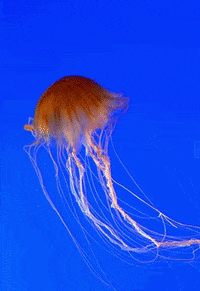menzies
Guru
Be careful all you blue hairs!
https://weather.com/news/news/2018-06-12-florida-jellyfish-stings-treated-lifeguards

Greetings,
Mr. m. Thanks for that. One thing in the link puzzled me. " You can also drive them away by shuffling your feet in the water as you walk." Hmmm...Not sure how that would work.

That is usually the recommendation for how to avoid being hit by a Sting Ray.
If unlucky enough to get stung, wash liberally with white vinegar, big bottle of it is standard equipment in summer over here.

If unlucky enough to get stung, wash liberally with white vinegar, big bottle of it is standard equipment in summer over here.
I've heard that! I've got to remember to put some vinegar onboard! Thanks!
Greetings,
A question for the "medicos" or those in the know...What are the chances of anaphylactic shock? Would it be prudent to put an epi-pen in the medical kit or are there OTC medications that might lessen the symptoms pending medical treatment?
Greetings,
A question for the "medicos" or those in the know...What are the chances of anaphylactic shock? Would it be prudent to put an epi-pen in the medical kit or are there OTC medications that might lessen the symptoms pending medical treatment?
Anyone can experience anaphylaxis. It can be life threatening. In the office, we alway have an Epipen handy. I’ve never had to use it on a patient yet in 35 years of practice. It likely will happen.
I think it would be prudent to have one on board as part of your medical kit. I do not at this time, but it is time to review and refresh our kit. You can buy a two-pack of Epipens. If you have a relationship with a physician, they can prescribe it for you.
Allergies are odd things. You can have a mild reaction to something once, and the next time you are exposed you can experience anaphylaxis. Having an Epipen on board can protect you and your family, as well as any guests you have on board.
There are risks to using an Epipen for certain patients with some types of heart disease or taking certain medications. However, unless you know you have one of those risk factors, I would use it.
Often folks are concerned about not knowing when/if they should administer it. I’m no expert obviously but my attitude is to use it at the first sign of life threatening symptoms. This could include swelling or tingling of the mouth and throat, shortness of breath, or light headedness and nausea. The risks of anaphylaxis are greater than unnecessary use of the epinephrine.
The Epipen has gotten stupidly expensive. You can now get other automatic epinephrine injectors that are much less expensive, particularly if you shop around.


Jelly fish is a growing problem in the Mediterranean also, as it is in the rest of the world. They say that at least 150,000 people were treated for jellyfish stings around the Mediterranean each summer. Still talking of Mediterranean species of jelly fish, some says that the best protection against stings may be suncream, which prevents the venom released by the tentacles from penetrating the skin, I do not know whether it's useful or not.
As a physician (medical doctor), I am frightened by the way you posted on this particular topic, Mr Dhays. In a public place you cannot make that kind of statement into which you can just post anything you want. So, judgment was necessary in determining what to put in and what to leave out. This is too important to people here, and risk are too high.
I think it would be prudent to have one on board as part of your medical kit.
You said that without giving the temperature much thought to people here. Are you aware about the importance of keeping epinephrine temperatures regulated at room temperature of 64.4-78.8°F ( 18-26°C) ? Do you know that epipen instructions say to keep epinephrine at an ideal temperature of 77 degrees, also to never leave epinephrine in a car since closed vehicles reach extreme temperatures in the summer and winter which is the same for boat. ? Why didn't you say that althought this was a crucial point ?
If you have a relationship with a physician, they can prescribe it for you.
Yes, but for you and you alone.
Having an Epipen on board can protect you and your family, as well as any guests you have on board.
Are you serious ? How can you make sure epinephrine (EpiPen) is safe for them ? Even if you have an official medical prescription from your health specialist, this does not, however, give you the right to take decisions for your family or guests or anyone else. Not only you may allow people to be in danger or hurt in this particular situation but you put yourself in danger as well to the law relating to the illegal practice of medicine.
There are risks to using an Epipen for certain patients with some types of heart disease or taking certain medications. However, unless you know you have one of those risk factors, I would use it.
How can you know whether your relative or guest is at risk of heart failure, possible cardiac sensitization, or not ? Many individuals are sick without knowing it. I see that in my practice daily.
If you want to run this risk, do so. But do not advise people here of the forum to run a risk which they perhaps cannot afford to take.
Professional help can be found through your family doctor, talk this over with him or her. Only if you get an individualized official medical prescription for yourself alone or others, keep the auto-injector for epinephrine in its carrier tube at all times aboard, at room temperature in a insulated lunch bag, do not refrigerate, protect it from light. Epinephrine can’t have ice directly on it, but wrapping ice and/or the epinephrine in a towel creates the perfect buffer. Then I place the epinephrine and towel into an insulated pouch which I never leave aboard when I am away from the boat.
Take a close look at the auto-injector and its instructions, be sure to ask your doctor a training session during your appointment. Also keep aboard a fully automatic wrist blood pressure cuff monitor with extra batteries which is a modest amount of extra expense for a valuable aid.
I have been a member of the forum for just 19 days after enjoyed it for six years as a guest. I was not here to criticise you neither to fight with anyone then I trust that my post would be deleted by the TF team. But the question as to how far to go in playing the sorcerer's apprentice with the very core of the health of others had, at some point, to be raised.
Could you clarify on this? Are saying jelly fish populations are increasing or more people are coming into contact with jelly fish?
La Mer, thank you for your post. Your concerns are completely valid and I appreciate your participation.
There likely is a difference in how Epipens are viewed and handled between France and the US. Even in the US, the laws vary from state to state.
As for the specific concerns you expressed;
- I generally think that TF members are reasonably intelligent and can, and will make their own decisions.
- specific information and training about the use and storage of an epinephrine autoinjector would be given with the prescription.
- Yes, a prescription is given for an individual, not any guest or other family members. However, we are talking about an emergent situation where there may not be EMS services at hand. What supplies one keeps on a boat in a remote location are going to be different than what one keeps on hand in ones home, a few minutes away from EMS services.
- Using a epinephrine on the wrong person, at the wrong time could kill them. However, anaphylaxis can also be fatal. If I am hours away from any type of medical aid and a family member or guest is having an anaphylaxis reaction, with an airway closing and heart rate dropping, I would choose to use an Epipen rather than watch them die. That is my choice but everyone will make their own choice.
Again, I agree with your concerns but not necessarily with your ultimate conclusion.
In reviewing my post, I recognize unequivocally that my tone was entirely inappropriate also I have gone too far in my last conclusion. There was certainly no justification for it, even if I was very concerned with some of your views.
I wish to sincerely apologize and I thank you for your last post.
